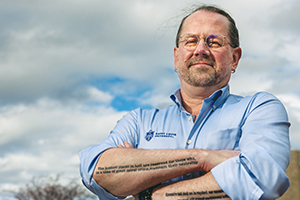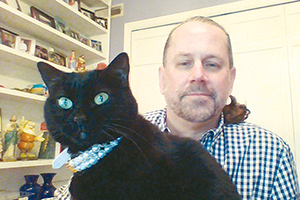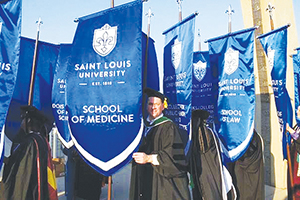By MARY DELACH LEONARD
When Dr. Fred Rottnek rolls up his sleeves, students at the Saint Louis University School of Medicine can see their professor's commitment to social justice permanently inked onto his arms.
On Rottnek's left forearm, stretching from his wrist to his elbow, are the words of the Eighth Amendment to the U.S. Constitution:

Dr. Fred Rottnek uses questions about his tattoos to start conversations on health care and social justice with students in the community medicine and physician assistance programs at Saint Louis University. He directs an addiction medicine fellowship for positions, to integrate expertise in substance dependence treatment into primary care.
Sid Hastings/© CHA
Excessive bail shall not be required, nor excessive fines imposed, nor cruel and unusual punishments inflicted.
Rottnek, a professor of family and community medicine at SLU, got the tattoo four years ago when he left his post as medical director at the jail in St. Louis County, Missouri. The tattoo signifies the 1976 ruling by the U.S. Supreme Court that denying health care to incarcerated people is unconstitutional. It also symbolizes Rottnek's commitment to correctional care.
The tattoo has become a teaching tool, Rottnek said.
"Students ask all the time, 'What is it?' And then I tell the story of a patient population that is guaranteed a right to health care," he said.
On Rottnek's right forearm is a popular quote, of unknown origin:
The hottest places in hell are reserved for those who, in time of great moral crisis, maintain their neutrality.
He calls that one his "solace" tattoo — his response to the nation's divisive political climate.

Dr. Fred Rottnek splits his week between working at home and on campus at the Saint Louis University School of Medicine. Here, Michelle, one of his two black cats, Zoom-bombs a video meeting.
Since graduating from SLU medical school in 1995, Rottnek has melded his love of teaching with his passion for providing health care to people who, as he puts it, "don't have access to hospitals with water features in the lobby.'' He cares for patients in jails, homeless shelters and clinics. Many are struggling with untreated mental health and substance abuse disorders.
When the American Board of Medical Specialties announced in 2016 that addiction medicine would be recognized as a subspecialty, Rottnek saw a new path for helping people with addictions. At the time, he was leaving his county jail post after 15 years because the county was considering privatizing correctional care.
"As I like to joke, I sat for my second board exams at the tender age of 53,'' Rottnek said. "This was about the time when the opioid epidemic was starting to take a huge toll."
Rottnek now directs the SLU Addiction Medicine Fellowship, which he helped to create, to teach doctors how to care for patients with addictions.
The fellowship is one of the first in the nation. Participants complete rotations in family medicine, psychiatry, telehealth and maternal fetal health at SSM Health Saint Louis University Hospital and SSM Health St. Mary's Hospital – St. Louis, and community clinics. The program is open to board-certified and board-eligible physicians.

Rottnek is in full academic regalia for the Saint Louis University bicentennial kick-off ceremonies at the Gateway Arch grounds in September 2018.
The first fellows — a family medicine doctor from a rural town and an emergency medicine doctor — applied because they were seeing a growing number of patients addicted to opioids, Rottnek said.
The one-year fellowship is funded by SLU, SSM Health, the nonprofit Missouri Foundation for Health and the Missouri State Opioid Response program.
"The opioid epidemic is an equal opportunity killer,'' Rottnek said. "It's bringing more attention to addiction medicine and behavioral health disorders — and also to the need to reimagine how to deliver health care in America."
Learning life's lessons with a two-by-four
Rottnek joined the SLU medical faculty in 2008. He is director of community medicine and the medical director of the physician assistant program.
This semester, he is teaching some courses virtually due to the COVID-19 pandemic, but he insists that clinical interviewing classes be held in person.
"We have to help students manage risk and benefit and get used to the awkwardness that comes with COVID,'' Rottnek said. "The worst thing we can do is have them do everything at home, and then, all of a sudden they're seeing patients live.''
Rottnek has always involved students in his work in jails and shelters. The experience is challenging — he calls it learning life's lessons with a two-by-four — and it requires students to leave their comfort zones.
Doctors in the addiction medicine fellowship work one day a week at Assisted Recovery Centers of America in St. Louis, where Rottnek is medical director. ARCA provides in-person and telehealth services throughout Missouri.
Aaron Laxton, a social worker who is director of business development at ARCA, said that if he could create an award for community medicine physicians it would bear a likeness of Rottnek, complete with ponytail, glasses and bow tie.
"The addiction fellowship program is cutting edge,'' Laxton said. "I think he challenges each of us professionally to be at the top of our field. He builds people up, and he brings people with him.''
Can do
At the onset of the pandemic, Laxton worked with Rottnek to develop new low-contact and telehealth programs to keep patients in treatment.
"A lot of people are quick to acknowledge that there's a problem," Laxton said. "With Dr. Fred, it's 'OK, how do we fix it?' And that is contagious.''
Fellows also work with Dr. Jaye Shyken, a SLU professor and medical director of the Women and Infant Substance Help Center at St. Mary's Hospital. The center treats women with addictions during their pregnancies and post-partum periods.
"This opioid epidemic is not going away," said Shyken, who is associate director of the fellowship. "We need to integrate this expertise into primary care.''
Rottnek's ability to make connections with people helped get the addiction medicine fellowship up and running, she said.
"He did a really tremendous job finding agencies and people who had goals that were aligned, but who didn't necessarily know it,'' Shyken said.
Hand soap
As Rottnek's tattoo suggests, he remains committed to improving health care in jails, prisons and juvenile facilities.
He recently became medical director of family courts and juvenile detention for the 22nd Judicial Court of St. Louis. And he has joined with advocacy groups pushing for safety protocols to control the spread of COVID-19 in the nation's jails.
While visiting jails in Michigan and Louisiana, for example, Rottnek was astounded to find limited access to hand soap, even as inmates were being told that hand washing is critical.
"If they ran out of soap — tough,'' he said. "Or, they had to buy it at the commissary, assuming they had money."
Rottnek, 56, grew up in St. Louis, where his parents owned a hardware business. He attributes his drive and work ethic to his blue-collar upbringing, but it was his experience with depression that eventually led him to medical school.
He describes what it was like to "hit a wall" that forced him to leave graduate school at Harvard, and, later, a Jesuit novitiate, before realizing that he was battling major depression and needed treatment.
"When it was time for me to think, OK, I'm feeling better, I started thinking about values that are important to me,'' Rottnek said.
He decided that becoming a doctor would allow him to combine his love of teaching with his goal of incorporating his personal values into his work.
"I took the back door into medicine, and that's why one of my taglines is, 'I don't love medicine. I love what I can do with it,''' Rottnek said.
Roots of addiction
After graduation from Saint Louis University medical school, he joined the family medicine program at the old Deaconess Hospital in St. Louis, where the focus was on community medicine.
"It wasn't fancy health care,'' Rottnek said. "It was going to homeless shelters and talking to guys who were down on their luck. And I just connected with them. I could be myself with them.''
Although current addiction treatment relies heavily on medications to suppress cravings, Rottnek believes more work must be done to ensure that patients get behavioral help tailored to their needs.
His work with incarcerated patients, who are forced to detox, taught him that people are incredibly resilient — and that clinicians should always look for the underlying cause of a patient's addiction.
"People develop addictions or risky use as a response to something. And that could be toxic stress and trauma in their lives. It could be untreated mental illness. It could be institutional racism,'' he said. "Medications are important, especially early on, but the behavioral interventions almost always have to be there, and we're finding out there are a lot of different ways to do that.''
Rottnek reminds his students that addiction is a chronic disease — and that some patients will relapse.
"You show me a chronic disease where people don't have their bad days,'' he said. "For example, every person I know with diabetes has had their blood sugar really high some days. But do we give up on them and take away their insulin? No, we find out what's going on.''
Humble sage
Rottnek serves on the boards of St. Louis health care nonprofits, including the Saint Louis Regional Health Commission, Alive and Well Communities, and the ARCHway Institute, an organization that assists people recovering from substance dependence and mental illness. He is an editorial adviser to Health Progress, CHA's journal.
The National Council on Alcoholism and Drug Abuse honored Rottnek with its 2020 Pioneer Award, citing his innovation and transformational impact in the field of substance use disorders.
But Rottnek eschews the notion of being considered an "expert."
"If I have an expertise in this field,'' he said, "it's only because I've had years of boots-on-the-ground experience.''